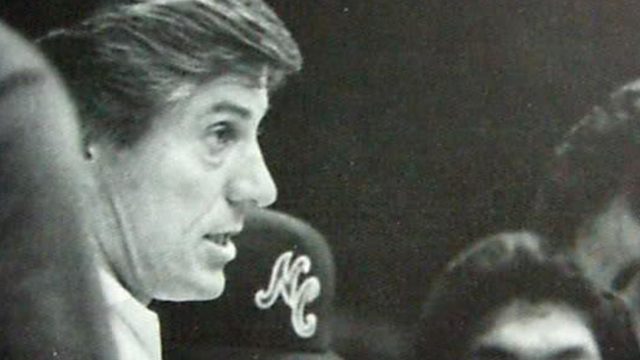SUMMARY
This is AI generated summarization, which may have errors. For context, always refer to the full article.

MANILA, Philippines – In 1982, one morning at the Rizal Memorial Coliseum, many coaches milled around the seats watching two American coaches handling a group of players. That session lasted for about one and half. Loreto Carbonell, the former cage great, watched pensively. Eddie Pacheco, then of UST, stopped smoking. Nemie Villegas of Letran was not his jocular self but was serious.
Later, at the Memorial Cafe and Restaurant, the coaches and former cage stars were intoned: “It seems there is nothing new but he drills them well.”
Only Ron Jacobs, a 5-foot-7 American, who rarely smiled but was nice man off the court, remained to carve a new chapter in Philippine basketball history. On Christmas Eve, the man who restored Philippine basketball’s winning fortunes in the 1980s, died on Christmas Eve, according to various reports, especially of sports columnist Quinito Henson.
Jacobs, 72, had been ill for 15 years after a stroke. He passed away 30 years to the date that the Philippines regained the Asian Basketball Confederation (ABC) championship in Ipoh, Malaysia. He would have been 73 on December 27.
The following year, EDSA happened and the 3-year-run of success under basketball project director Danding Cojuangco was interrupted.
Jacobs first led the Philippines to the 1982 Asian Youth title, then the Jones Cup and the ABC titles in 1985. He would have handled the 2002 Asian Games team but had that stroke, which led the PBA to name Jong Uichico, one of the first players recruited by Jacobs in 1982, as coach.
“People think it was not that difficult to form a champion team but it took a lot of work. We had to change players when it was necessary but we kept the core,” said Filomeno Pumaren Jr., the long time assistant to Jacobs in the national team told Rappler.com in a phone interview.
In winning the 1985 ABC, Jacobs kept the team on a tight leash. “Teamwork helped us a lot. China was taller than us but we beat them. South Korea gave us a hard time but we won,” said Pumaren.
In the championship round, the Philippines turned back a second-half rally by South Korea to win 76-72. In the last game, the Philippines beat China, 82-72 to finish with an unbeaten 6-0 slate.
Under Cojuangco’s stewardship from 1982 to 1986, the Philippines used naturalized players to add depth to the national pool as the best collegiate talents headed to the PBA. It was a trend in some European countries but this was the first time it was done here. The purists had a field day attacking this policy but the national pool’s depth was shallow. Thus a system of training had to be forged and naturalized players recruited to reinforce the team.
Among the foreign players recruited were Ricardo Brown and Willie Pearson. The high-leaping 6-3 Jeff Moore remained, and later 6-8 Dennis Still was taken in. Deadshot Arthur Engeland, now a shooting coach of the San Antonio Spurs in the NBA, was recruited in 1985.
Cojuangco kept the team, first as Northern Consolidated, and then San Miguel Beer together. Jacobs was always looking for new talent, especially among the collegiate ranks. His 1982 squad, for example, was a far cry from the 1985 San Miguel team that won the PBA Reinforced Conference.
Pumaren said Jacobs was tough on the court. “He would say, ‘I like this, I like this.’ He would always remind the players what they should do,” said the veteran mentor. “Outside the court, we are all equal.”
Jacobs was simple and down-to-earth. He wasn’t fond of elucidating theories but kept things simple. He would talk to a sportswriter if he thought what was written wasn’t accurate, but the day after that, Jacobs would seek the reporter and apologize.
In a Facebook private message as part of an interview for a forthcoming book on Philippine basketball tentatively titled “Years of Glory,” Brown, who later shone in the PBA playing for Great Taste, said: “The timing was right for Ron Jacobs and Philippine basketball.”
Brown said Jacobs defense was simple: “Man to man, with help in the middle.” Jacobs would stress fundamentals and practices were not only mere scrimmaging.
Jacobs’ ace was using a players’ strength. For example, Engelland shot the ball and rarely anything else, like “being a creator or a ball handler.” Pumaren also said players had to defend. “Ron doesn’t like players who can’t defend.”
Jacobs’ legacy lives on in his players who are now coaches like Uichico of Talk ‘N Text. – Rappler.com
Add a comment
How does this make you feel?
There are no comments yet. Add your comment to start the conversation.